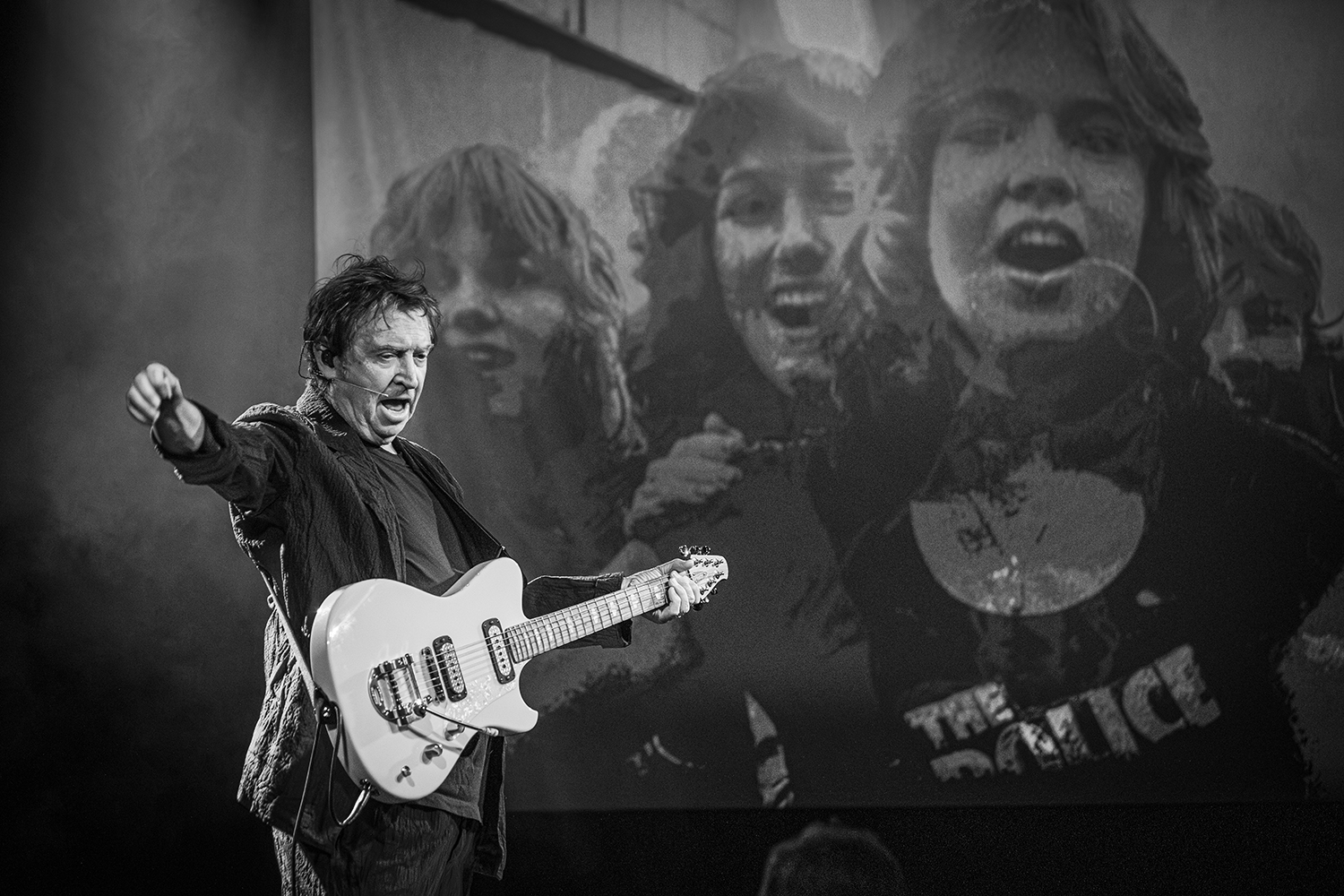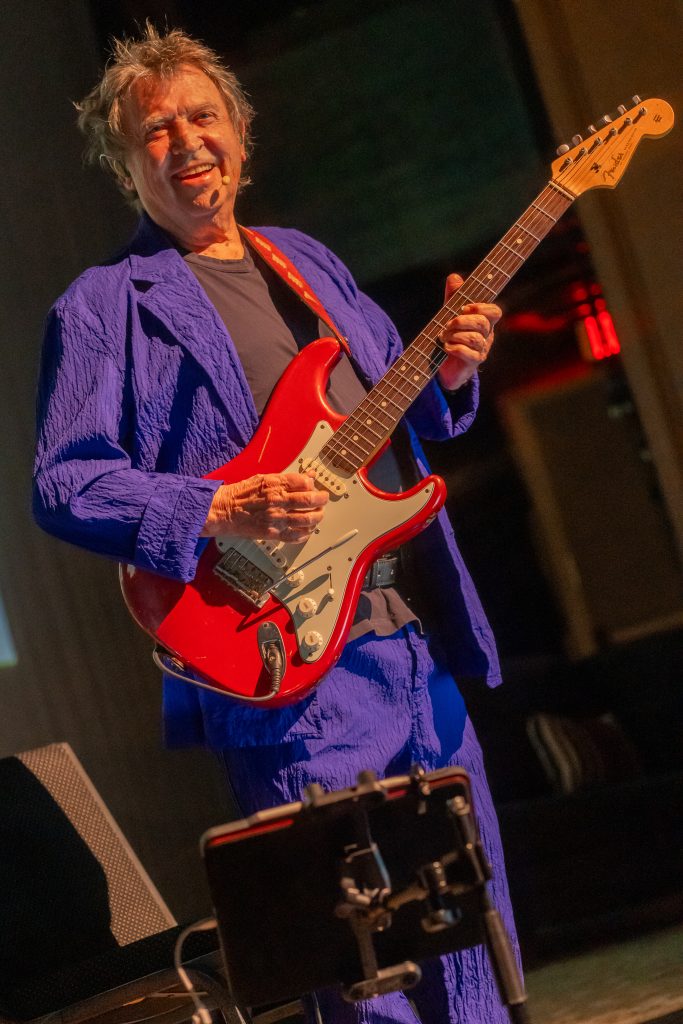
photos by Nesto Hernandez
Entering a photography exhibit and staring into the soul of a great image can be intensely emotional. Seeing a talented guitarist bearing his soul onstage is sometimes even more impacting. Guitar veteran Andy Summers knows that, and when he played textural ambient music live while projecting images from his book A Series of Glances on a stage-sized screen, the atmosphere was palpable. For the tour, Summers complimented his photography with effected tones and drones he associated with the images.
The shows promoted the recent release of his 11-track, 23-minute long extended EP Vertiginous Canyons, a stirring wash of compositions inspired by some of his favorite photos. “A request was made for me to put some music into this beautiful photography book I did, and I thought it was an interesting idea,” he explains. “But in a sense, it’s not unlike things I’ve done in the past, scoring music for films. I’m looking at my own visuals and then putting music to them. I tried to create what you’re calling an ambient atmosphere because I thought that was appropriate for the photography.”
“I never ever want to see a chorus pedal again In my life. There are times I’ll hear something and think, “Man, just take the chorus off. Let’s hear a great guitar sound made by balancing bass, treble, and mid.”
To say Summers is somewhat ambivalent about the project is, perhaps, an understatement. He’s pleased that the reviews of both the EP and the concerts have been overwhelmingly positive. At the same time, he’s annoyed that he’s primarily asked about Vertiginous Canyons and The Police, and the press don’t seem terribly interested in talking to him about his soundtrack work, (which includes Down and Out In Beverly Hills and Weekend at Bernie’s) or the many jazz albums he released, most of which he’s happier with than his latest project.
“It was music that I did for a book,” he says. “It wasn’t meant to be an album.”
FretBuzz: Okay, but you released it, and it’s quite sweeping, epic, and evocative. The tracks are cinematic and ambient – almost devoid of drums – yet it feels like a complete composition.
Summers: Mate, you’re many years behind. I was doing this years and years ago. It makes me laugh. It’s like people just woke up to me doing this. I did this album just in one quick session with a guitar. It was nothing. I did these albums a long time ago. I thought [my 1989 solo record] The Golden Wire was a brilliant album, which is way past this stuff. It’s not new to me.
FretBuzz: What originally turned you on to atmospheric, ambient guitar music?
Summers: In the early days, I quite liked the music that was being put out by Brian Eno, like Another Green World. But before that, I was very involved in classical music. I’d been listening to this kind of stuff since I was 17 years old, so I was a pretty educated musician.
FretBuzz: For Vertiginous Canyons, did you take advantage of the new frontier of guitar effect pedal to make swirling, swooping sounds?
Summers: I just looked around the studio and saw what pedals and devices I had so that I could make each track sound of its own. Its character was defined by playing through different electronic pedals.
FretBuzz: What were your go-to effects? It sounds like there’s some reverse reverb in there and modulated delay.
Summers: We can have a nerd talk or whatever, but it’s all about the music. It doesn’t matter how you get there. I’m not going to talk about pedals.
FretBuzz: Well, we’re a guitar web site.
Summers: Okay, that’s fair enough. You are a guitar site, but, I mean, it is very nerdy. I’ve got some different stuff that’s not on the market. Let’s just say I try to find — in terms of that sort of nerdy stuff — anything that’s not chorus, echo, and fuzz. But what are the other alternatives? I want to do some new stuff, so I should probably look around because years after some of us musicians were trying to be original, the pedal makers have finally caught on.
FretBuzz: There are far more boutique pedal makers around now and some of them are doing really interesting things to bend and contort conventional sounds.
Summers: But at the same time, you’ve got a stampeding herd of pedal makers who want to make yet another chorus pedal and get another fuzz box or yet another reverb unit out. It goes on and on and on. Only occasionally does someone break out and do something different. I am always trying to find a different sort of voice, and if you manage to hook some pedals together in a way that’s really interesting, it will produce some kind of fun music here and will bring out a voice that surprises you. I think that was very much my approach to doing this EP.
FretBuzz: What guitars did you use and how did you record the tracks?
Summers: I played a Stratocaster for most of it. I did it in ProTools and it took me about three hours to do the whole lot.
FretBuzz: It doesn’t sound like it was just banged out. The tracks have atmospheres that flow together and the whole recording is cohesive.
Summers: Well, you know, I’m skilled. What can I say? And yes, I’ve been doing this all my life. I’ve been around all this gear and I’m a great guitar player, so it wasn’t so hard for me to cut stuff like that.
FretBuzz: Yeah, but as chef Alton Brown says, anyone can make an omelet, yet it’s one of the easiest dishes to screw up.
Summers: Okay, yeah. You know, people come up to me and say, “Oh, that’s a good one.” Well, thank you, but I have to say this because maybe it’s not jazz. It’s a bit simpler. There’s not many chord progressions and I’m not playing bebop lines over this stuff. But it’s very pleasant to listen to and it comes easy to me. What’s amazing to me is that I was doing this years ago and people weren’t ready for it. This time, the reaction has been so good, which is strange to me, but I’m thinking, “Well, now maybe I better do another one.”
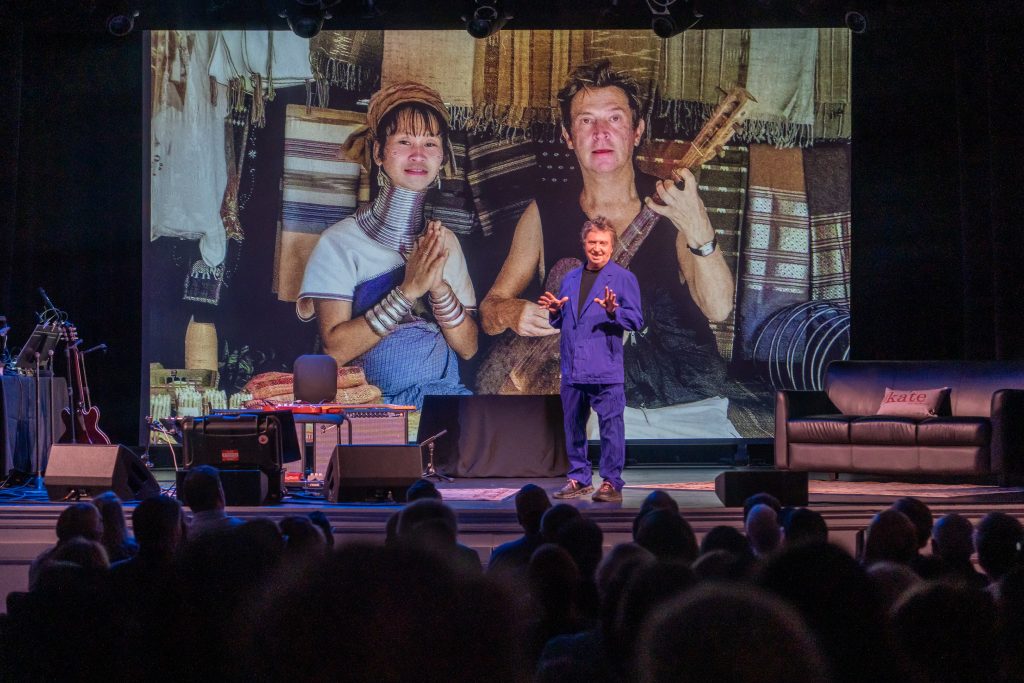
FretBuzz: Is there a synergy between having an eye for photography and having an ear for music or are they apples and oranges?
Summers: There’s definitely a synergy. To me, music is the greatest of the arts. It’s the most abstract and I think it’s the primary art. Now, if you can bring those sensibilities to another medium I think you’re already ahead of the game. I came into photography with a head full of music and abstract thinking and all sorts of stuff. I was a pretty educated musician, so I’ve been through a lot of things with music But, of course, I was a guitarist and in an unconscious way that definitely filtered into my photographic efforts.
FretBuzz: You picked up guitar after playing piano. Do you think piano gave you a firm foundation in music that helped you become an accomplished guitarist?
Summers: Absolutely. But I’m a completely natural musician. I was born into it. So, I did play piano and then a guitar was put into my hands when I was 14, and there was an immediate bond. That was it. The path was set at that moment.
FretBuzz: Was it a high-quality instrument?
Summers: God, no. It only had five strings and I didn’t know how to tune it or make chords or anything. But the drive was there and I figured it out. It was complete love right from the very first seconds. I never put it down, and it’s never gone away.
FretBuzz: What was your first electric guitar?
Summers: It may have been a German guitar called a Voss. I had that when I was about 14-and-a-half. I had that and a little simple practice amp. I started playing jazz stuff right away. Obviously, I was a natural. I was into Wes Montgomery and I was learning the whole solo for “West Coast Blues” by the time I was 15. That was fantastic for the actual physicality of guitar playing and also chord knowledge. Trying to hear what those chords were and trying to get the line was a real exercise. So, that went deep into me at that age, and, of course, you never really get past that because Wes was definitely one of the greatest of all time if not the greatest.
FretBuzz: You started playing in the British R&B group Zoot Money’s Big Roll Band in the mid- ‘60s.
Summers: I was living in the seaside town Bournemouth, and I hooked up with a guy called Zoot Money, who was a very talented rhythm and blues singer. He taught me a lot because I was a total jazz player and Zoot started introducing me to Ray Charles, and American R&B artists, and blues so I got into that bit. He showed me a lot about time and feeling in black American music, and so we became very strong friends. We moved up to London together with absolutely nothing and started our lives as so-called “professional” musicians.
FretBuzz: Were you an immediate success?
Summers: At first, we were starving. We had nothing. And then somehow we got an audition at the Flamingo club in the West End of London, which is where everybody played. And they said, “Alright, you are the new house band.” We were so happy. We said, “Yes, okay sir.” We couldn’t believe it. They had other artists, but we were there a lot and it totally set us up. We got a drummer. We got a bass player, then eventually, we got two saxophones and Zoot played the organ.
FretBuzz: Didn’t the band with Zoot mutate into the psychedelic band Dantalian’s Chariot? Then you joined Soft Machine, another band that was pretty out there.
Summers: I took a lot of acid, and that’s what you did in those days. It was around the opening of all this culture. Indian music was coming into England. Ravi Shankar arrived on English shores. The Beatles were getting psychedelic. A new consciousness was waking up, and everyone in a band grew their hair longer and guitar solos got longer. It was a brilliant time and there was a flowering of the arts and there was an openness to everything.
FretBuzz: Was it revelatory to be a part of that awakening?
Summers: Yeah, it was. We were reaching for “the other,” if you like. It was acid rock, I suppose. I played long solos over drones and we had a light show and all sorts of things like that. Everyone was getting high on it. Yeah, marvelous.
FretBuzz: Could you play on acid?
Summers: I only ever tried that once. I was sort of coming down from an acid trip and everything was still pretty spacey. I pulled it off but I felt pretty weird about it. I thought, “I can’t do this under a drug like this.” You know, you look at the end of your guitar and it goes on for miles. It took great effort to play and I didn’t really enjoy it. I remember thinking, “Oh, it’s going to be incredible to play like that,” and I found out that it wasn’t at all, and I couldn’t play as well.
FretBuzz: Did you play originals with Zoot?
Summers: We could both write, so we dropped all the Ray Charles knockoffs and James Brown – which we were very good at — and started writing our own material. Instead of aping great American R&B very well, we started playing psyched out semi-Indian music. It’s very funny thinking back about it, but we were very young. We were about 22 years old and we went with the times.
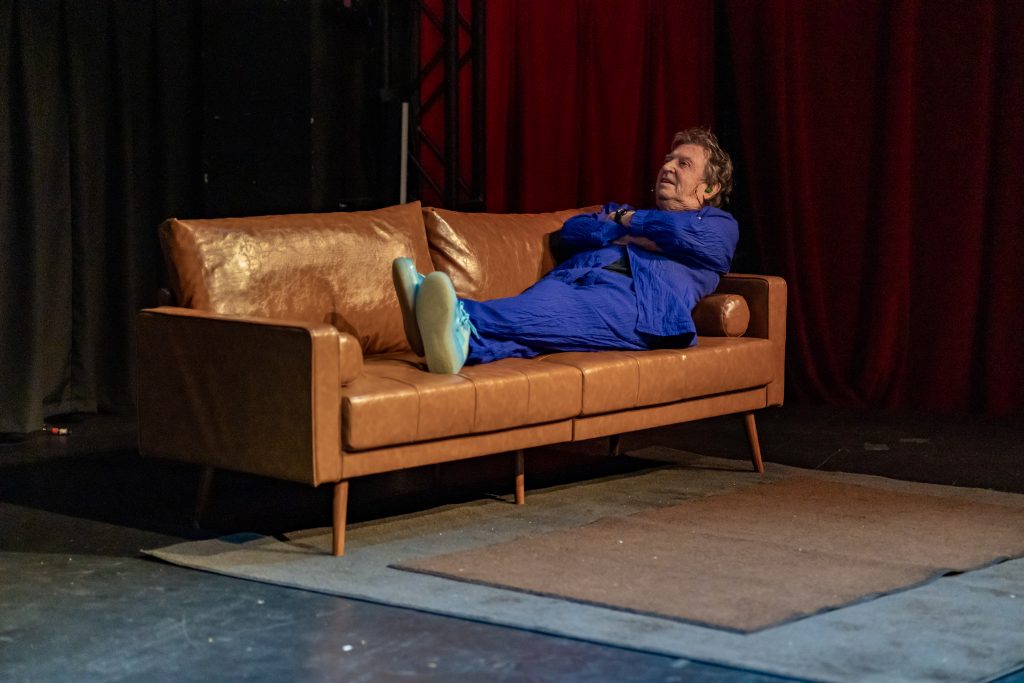
FretBuzz: Having been schooled in classical, jazz, and blues, how did you feel about the punk rock movement? Did you think it was atonal and barbarian?
Summers: They’re all cliches, and it’s hard to talk about cliches, but to me it was not about music. It was about these kids who, at a very base level, wanted to be famous, but didn’t know anything about music. They were all supposed to be so angry and somehow it was to their benefit that they couldn’t play. Anybody could do it. There was all this attitude in it, and but there was not a lot of music that came out of it, and that’s why after about three years it died. It was more about culture and youth than about music, and the music was a scum, scuzzball soundtrack. It didn’t mean much.
FretBuzz: Maybe that’s true on a macro level, but some popular bands arose from the scene. What did you think of The Clash and The Jam?
Summers: Not much, really. They weren’t even punks. Joe Strummer came out of a middle class family. They weren’t, like, working class punks at all. And the Jam were never really punks, either. They were better than that. Paul Weller was really good, actually. I also liked some of the American stuff. The Ramones were really great fun because it was better than the English stuff. They had this attitude of, “We’re actually taking the piss — [making fun of the scene] – here.” They had the look, they played very fast, and their songs were no more than two minutes, but they were funny. It wasn’t all angry.
FretBuzz: When punk was a movement, lots of bands wanted to jump on the bandwagon, and even The Police were on the periphery of that.
Summers: Well, yeah, absolutely. We’re not punk. [Drummer] Stewart [Copeland] was very driven to be seen as a punk band, but of course, he was working with two musicians who were anything but that. But yes, at the beginning we were sort of trying to assume the punk identity, which was ridiculous. We had the music and we had the aggression, but there was a lot of fakery in wanting to appear like that.
FretBuzz: Both The Clash and The Police had elements of reggae in the music. Obviously, you were very different bands, but there was that link between you. Did that stem from what was happening in England in the underground club scene?
Summers: We have a big Jamaican population in London, and we were surrounded by it. Obviously, Bob Marley was very popular all across England and there were other very good reggae artists as well. So, I think it’s fair to say that we did a little bit of reggae because we liked it. But we didn’t want to be a reggae band. People say reggae was a big influence. Come on. We’re not reggae at all. Don’t you here all these other things in there that are so much more interesting? Do you hear any D minor ninths in a reggae band? I don’t think so. And one other small fact about it is that for Sting, as a bass player and singer, the reggae was a flag of convenience for him to not have to play eighth notes or sixteenth notes all the way through a song. So, the reggae tag was accepted and we were given this sort of cultural badge of merit, but we were not a reggae band. UB40 was a white reggae band. We were making original music that sounded like nobody else. We were creating our own style.
FretBuzz: Were The Police an amalgamation of your collective influences?
Summers: Well, our set of influences and the way Sting and I could play was so different than most rock bands, and that was offset by Stewart’s drumming because he was very into punk. But he was much better. I think he actually grew up and listened to Count Basie. He was trained and had this great high-hat thing going that was the polar opposite of what Sting and I were doing. So, it was these sort of destructive things that did not really go together that made for that unique chemistry. And we injected it with a lot of intelligence and a lot of knowledge about music, and critical analysis of our own stuff. We’d look at something and say, “Well, you’re not going to play that because that sounds like you know who and, so, we’re not doing it.” So, in a very detailed way on the guitar, I would try to be creative and thoughtful about my parts. I would never play a barre chord. Why would you do that? That’s like the old stuff. I was playing parallel ninths, seconds, minor thirds, anything to make the chords sound different. And when I would do that, I’d use a chorus and an echo, and you’d really start to get a guitar sound that is beautiful and clear. And it added space to the music of The Police and made more room for the vocals.
FretBuzz: You were one of the pioneers of the chorus pedal in pop music, and soon after The Police became popular the chorus became a trademark sound for ‘80s music.
Summers: Yeah, it became too much. It got worn out. I never want to see a chorus pedal again, ever in my life. There are times I’ll hear something and I’ll think, “Man, just take the chorus off. Let’s hear a great tone and a great guitar sound made by balancing bass, treble, and mid.” Most of my life – before this technology wave hit in the mid-to-late ‘70s – you were looking at your Twin Reverb and balancing those three controls, and that was it. And I was very picky about the settings. I put a lot of thought into tone. I’d think, “How can I make my guitar sound great? How can I alter the tone control so that it really is good? Do I want a really bright, harsh, tinny sound? Or do I want a sound that’s a little more formulaic? How do you want to sound when you play a big chord and how should it be different when you play something soft?” There’s all this stuff that you work out as you go along, and it’s very much a marker of who you are. And I think you try to individuate yourself out from the herd of other guitarists to make your own sound.
FretBuzz: You mentioned that all three members of The Police had contradictory approaches that shouldn’t have worked musically. Did everyone struggle to make sure their identity was in the forefront of the sound?
Summers: We’re a fiery little band personality-wise, but we all like to reach what we would call the “type compromise” or the “talk compromise” which is where we discuss how we would play a song and I would say, “I could do this, I could do that. I could play one every four bars and the echo could carry out. Or I could play a strong rhythm.” And some of that would depend on what Stewart was doing because normally the bass would play with the kick drum. So, these are all the things that you do in a band when you are trying to make something. I can’t say that we had much trouble with it because we were all pretty talented. And as we started to rehearse, that’s when things slowly emerged and we found our way and we’d go, “Oh, that sounds like us.” Suddenly there was an “us,” where there hadn’t been one, and that made us proud about having our own style. People say, “You guys don’t sound like anybody else. What are you doing?” So, there’s a little bit of magic in this stuff. That’s what you hope for, anyway. And we sold 75 million records. Something magical must have been going on.
FretBuzz: A lot of great bands have that magic, but never become popular. Did you always know you were going to be huge?
Summers: No, we didn’t. We thought, “Oh my God, wouldn’t it be great if we ever got into the Top 10?” Our ambitions were pretty modest. We just liked to work because we were starving and desperate. We were. Out of work. No real momentum. I was able to survive because my wife was working and earned money. But we were really hanging by a thread. Sting had a baby. So, there he was, 22 years old, and he was living in a van. We started from nothing, and then everything turned around when we came to the U.S.
FretBuzz: You’ve spoken about a show at CBGB that was a turning point for you as a band.
Summers: Things weren’t going so well, and as a last gasp, we got a little tour put together in the US because Stewart’s brother Ian was reckoning he could be a musical agent and got us a three-week tour of the East Coast. The first gig was at the mecca of punk in New York at CBGBs. Now, we had been spurned in England. We weren’t punk enough for them so we weren’t doing well anymore. We came over to the U.S. to play CBGB and they loved us, and that was it. We went, “Oh, we’re not punk, we’re new wave.” That was the word people were using. So, now we were a band alongside Blondie, Talking Heads, and even the Ramones. There was something happening there.
FretBuzz: How did crowds react when you got back to England?
Summers: We did that three-week tour, then we did a little tour in England as the support for another band and somehow we connected. There was a mob scene of punks raging for us. And the band we were opening for were standing there and their faces went white because we were going to do a 21-date tour in England and they saw we unleashed the beast on the first night. Every night after that was a total riot scene. Girls were ripping their clothes off. It was amazing and very exciting.
.FretBuzz: Was succeeding in Europe after an initial lukewarm reception a real vindication?
Summers: It was great, but that wasn’t the real focus. It was all about you’ve got to break America. We were on the road relentlessly, and we had incredibly long tours and vans and it took us three albums before we really felt, “Okay, we’re there. We’re playing much bigger places – stadiums even.”
FretBuzz: Did you enjoy the ride to the top or was it a case of be careful what you wish for?
Summers: Both. It was great, but it was hard. You are on the road for an incredibly long time and you have to have mental diversions because you can go nuts. But we were all pretty educated guys. We mostly read novels. Of course, there were girls, but I’m not going to talk about that too much. There were rabid fans everywhere. We were very popular.
FretBuzz: Did you enjoy each other’s company back then?
Summers: Yeah, people seem to always think, “Oh God, they hated each other.” That’s not true. We were all very intelligent people so there was a lot of English wit and sarcasm and irony that accompanied us everywhere. It was business as usual. So, to a degree, in those early times, it could be pretty hard to take, but we were all young enough and we had the physicality to do it. We loved playing together and we would bring the house down every single night. People couldn’t get enough of us. They wanted to take us out, feed us, take us to their houses. It was a lovely time in many ways. So, I think we definitely had camaraderie. We couldn’t have done it otherwise. We all supported one another no matter what the press or outside people say. They will never know what it was like to have been in the band. There’s only three people who know that.
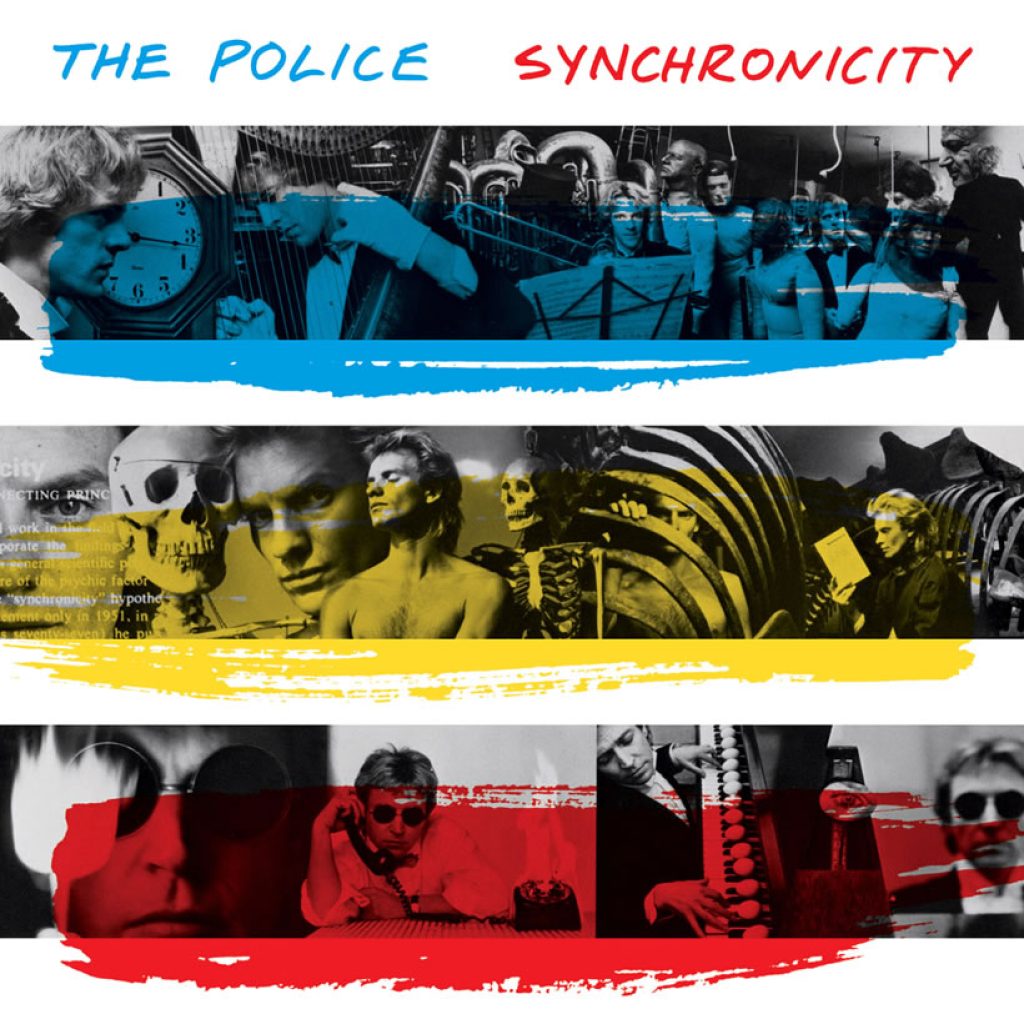
FretBuzz: There’s a new deluxe, multi-disc box set of the band’s last album, Synchronicity. Did you play a major role in remixing or choosing bonus tracks?
Summers: It was pretty much done by the record company. They’ve got some guys who go around searching for all this stuff, and they say, “Hey, guys, what do you think about these outtakes?” They have to get our approval on everything, so they send us proposals of where to put things and what B-sides to use. The process is all fairly pleasant but we don’t do terribly much.
FretBuzz: Going back to that period of your career, it was your last album and it was immensely successful. There was less of a reggae vibe on it than on your other albums and more synths. Did you enjoy making that chart-topping record, and did you go into it with the goal of making a big hit album?
Summers: Of course we wanted it to be huge. It was difficult because, clearly, Sting wanted to leave the band by the time we got to number five. He said, “Well, we signed up for five records. That’s what we’re going to make.” And then he was off. “I’m leaving the band.” It’s a big joke. That was one of our phrases as we went through our career. When we started off, we had a roadie we called Dave. That’s all we had – one roadie — but we couldn’t believe someone was helping us. It seemed like an incredible luxury. Dave came from the Western country of England, where they haven’t got a normal accent. So, the phrase came out, “I’m leaving the band,” and that became one of the continuous lines we used all through our career, even when we were playing onstage. We loved Dave. He was a normal working class guy and he helped the band to become successful. And then, of course, one day he left. When we came to New York and we were starting to be something, Dave comes down at the hotel and says, “I’m leaving the band. I’m going to the airport. I can’t take it no more.” We said, “No, you can’t leave,” but he did. It just became too stressful for him. Poor guy.
FretBuzz: Since the expression, “I’m leaving the band” was an inside joke, did you think Sting was taking the piss when said he wanted out? Or did he have one foot out the door for a while?
Summers: There was a period when we were very much a band and really making it and everybody loved us. But I’d say somewhere around the period of the fourth record, I think he started to see something else. He wanted to be on his own.
FretBuzz: You all tracked the songs for Synchronicity in different rooms.
Summers: It was very weird because I stand by the drummer and I like to hear the high hat when I play. When we recorded, I was actually the only one in the studio and we did it all through headphones.
FretBuzz: Was that because no one wanted to be in the same room with one another or was there another reason for the unusual approach?
Summers: It was purely to get the recording quality we needed in the production. We needed a big room with quite a bit of ambiance. Sting plugged straight into the desk and I was in the studio with a Fender Twin. It was determined that we had to be in separate rooms so there wouldn’t be any sound bleed in anyone’s tracks.
FretBuzz: Clearly, you figured out how to make it work. Is it true that you recorded “Every Breath You Take” in one uninterrupted take?
Summers: I did. I nailed it in one take all the way through. Everyone stood up and applauded afterwards, and I took a bow. And then the manager poked his head in and said, “Right, I’m taking this straight to the record company. It’s going to be huge!” And the song went straight to number one. That was a great moment. And it’s had, I think, two-and-a-half billion streams on Spotify. You could say that the most played air-guitared part of all time came from me. No one’s got that. It’s a fact. Put that on your website.

